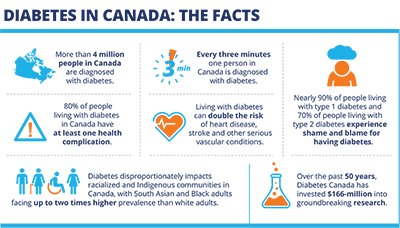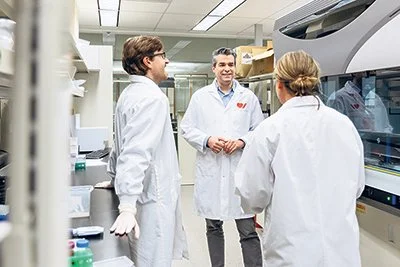A fun fact that I absolutely love sharing with folks I meet in my professional (and personal) life is that we at Diabetes Canada are the proud owners and caretakers of the Banting House National Historic Site in London, Ontario. The house belonged to Dr. Frederick Banting, and it’s the place where he woke up one stormy night in 1920 with a brilliant idea that ultimately led to the discovery of insulin.
Read MoreFebruary is Heart Month. And the conversation about heart health isn’t just timely, it is urgent. After all, more than half of Canadians are personally impacted by heart disease or stroke, according to a 2024 Heart & Stroke poll.
Read MoreSettling the great debate – Team Cat or Team Dog
In Nova Scotia, about 8,800 charities and non-profits work to support the one million residents in Canada’s second smallest province. Through Nova Scotia Gives, GivingTuesday is an opportunity not only for fundraising but also to recognize and celebrate the contribution of philanthropy throughout the year.
Read MoreOver the last few years, researchers across the country have been building something that will help change cancer research and care in Canada. The Gold Cohort is Canada’s largest and most complete cancer case resource and includes data from thousands of diverse cancer patients treated in centres across the country.
Read MoreCanada is undertaking bold nation-building projects to secure our future. Today, Canadians have a rare opportunity to be part of one of the most significant conservation opportunities in our country’s history: one that delivers economic and environmental benefits across the country and around the world.
Read MoreA powerful encounter between Heart & Stroke-funded researchers and the people whose lives were saved through their work
Over 3.5 million people in Canada – across ages, ethnicities and genders – are affected by heart disease and stroke.
Read MoreCannabis use among young adults has become increasingly normalized, especially following Canada’s legalization in 2018. According to the 2024 Canadian Cannabis Survey by Health Canada, close to half of those who reported non-medical cannabis use at least once in the past year were 20- to 24-year-olds (48%), followed by 16- to 19-year-olds (41%) and then those over 25 (23%). Cannabis use is now a common part of social settings and even medical conversations, however, despite its growing acceptance, there are still many unknowns, particularly when it comes to its impact on developing brains.
Read MoreMany great performers have shared unforgettable moments with audiences at Massey Hall and Roy Thomson Hall in downtown Toronto. The Corporation of Massey Hall and Roy Thomson Hall, the not-for-profit organization that operates the iconic venues and additional performance spaces in Allied Music Centre, is leveraging the power of music to bring people together and help foster a more connected and understanding society.
Read MoreWith 4.4 million Canadian households living in core housing need, governments, non-profits and community providers cannot address the housing crisis alone. Now, an innovative new model promises to bring “socially inspired capital” to support greater investment in affordable housing.
Read MoreNestled between two lakes in the southern Okanagan Valley of British Columbia, Penticton has historically been a tourism hotspot and a popular place to retire. While that remains true, the city is increasingly becoming a permanent home for young professionals, families and entrepreneurs. Penticton is growing, experiencing robust development and becoming more diverse.
Read MoreWith around one in five charities noting an increased demand for services in both 2023 and 2024, the sector is facing a dual challenge of stretching their already strained resources to meet growing needs, according to a report by the Charity Insight Canada Project at Carleton University in Ottawa.
Read MoreJoyful anticipation – which comes with mapping out life stages like educational and career pathways or family and retirement planning – is not a sentiment commonly associated with end-of-life preparations.
Read MoreVaccines of the future are taking shape today at the University of Saskatchewan’s Vaccine and Infectious Disease Organization (VIDO).
Read MoreCorporate real estate (CRE) professionals from across North America will come together in Anaheim, California, October 27 to 29, for the 2025 CoreNet Global Summit, North America. These CRE practitioners will be sharing strategies for preparing for the future during a time of significant change. A key theme will be driving innovation amid shifting workforce needs, new economic pressures, and the heightened focus on sustainability and inclusivity in the buildings and other facilities in which employees work.
Read MoreDigital innovation is transforming all aspects of our society including provision of mental health care services. Telehealth and support systems based on artificial intelligence (AI) have emerged as promising new tools to expand access to mental health care and make it more affordable.
Read MorePost-secondary education, considered a key pathway to success, is widely acknowledged for the potential to boost quality of life and career flexibility for individuals, improve outcomes at community and business levels – and enhance Canada’s prosperity and competitiveness overall.
Read MoreWhat if you could donate to a charity of your choice and – at the same time – support the local resource industry?
Accelerating philanthropic impact and mineral exploration with flow-through share financing
Across Canada, there is a heightened focus on advancing resource sovereignty, with a spotlight on the critical minerals needed for energy security.
Read MoreAt a time when Canadian governments are implementing measures to strengthen the nation’s economy in an uncertain world, stakeholders in the organic agricultural sector are calling for concerted action to unlock the full potential of organic agriculture.
Read MoreWhen areas in Bedford, Nova Scotia, experienced more than 250 millimetres of rain in just days in July 2023, the resulting devastation caused country-wide alarm. Considered one of the highest impact flash floods in Canadian history, the incident served as a stark reminder how extreme weather events increasingly place communities at risk.
Read More


















